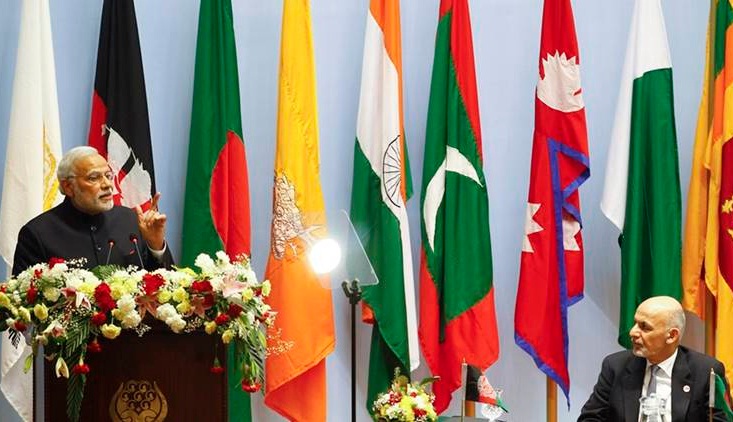By Mohammad Mosa Ahmadzai-After the Second World War the importance of regionalism has become increasingly and unavoidably important. World politics entered into a new era of regional integration and economic cooperation. South Asian Association for Regional Cooperation (SAARC) was proposed from 1970 to 1980 by Ziaur Rahman, the then president of Bangladesh.
After that he visited India, Sri Lanka and Nepal. He stated the south Asian countries have afflicted by social and economic problems and he proposed a regional organization which was accepted by the leaders of south Asian countries in December 8, 1985. India, Pakistan, Nepal, Bhutan, Maldives, Sri Lanka and Afghanistan are members of SAARC. Its headquartered is in Kathmandu, Nepal.
SAARC is considered as an important organization but still it has faced with many hurdles. The contentious issue of south Asian countries especially India and Pakistan has faced SAARC with failures. Unemployment, hunger, poverty, illiteracy, economic backwardness and lack of stationary energy resources have created obstacles before SAARC. The conflicting and diverse interests of south Asian countries, fear of Indian dominance, suspicion, mistrust and different political systems of are also huge uncompromising issues which lead to failure of south Asian countries integration. The SAARC member countries can settle down all the contentious and conflicting issues by smoother relationships.
The objectives of SAARC are improvement of welfare and living standard of the south Asian people. To accelerates economic, cultural and social growth. To work for a dignified life and meet the needs of the people of SAARC member countries, and promotion of self-autonomy of people, and establish mutual trust among the member countries of South Asia. Since its formation as an important organization it has achieved approximately its goal of economic cooperation and regional integration. It has achieved at unprecedented level its goals of economic, social, cultural and maintained trade relations between member countries.
After collapse of the Taliban regime and the formation of transitional government in Afghanistan, it was Afghanistan’s foreign policy priority and its indulgence in regionalism to promote cordial relations with south Asian countries.
Relations of Afghanistan with SAARC member countries are of a paramount importance. Afghanistan suitable location is important for SAARC member countries; Afghanistan can connect south Asian countries which has lack of stationary energy resources with central Asia which has abundant stationary energy resources. Afghanistan became the member of SAARC in 2007 in the 14th summit of SAARC which was held in New Delhi, the capital city of India. Both political rivals India and Pakistan have shown their interest and welcome Afghanistan as a new member of SAARC.
Afghanistan conclave location is very important for south Asian countries. It’s potential as a conduit for central Asian gas and oil. Afghanistan is dependent on SAARC member countries for its economic and social development, peace and stability. South Asian countries need Afghanistan for the completion of energy transition and trade with Central Asia.
Even before the membership of Afghanistan in SAARC, the former Afghan President Hamid Karzai used to participate in SAARC summits. He had the desire for Afghanistan to become member of South Asian Association for Regional Cooperation. In 2014 in the SAARC Summit, Karzai stated that Afghanistan needs regional cooperation for economic and social development and the establishment of peace and stability. He also stated that a stable and peaceful Afghanistan is necessary for regional peace and stability. Karzai also said that illiteracy, poverty and terrorism are the obstacles before the south Asian countries and regional countries should cooperate with each other by common analysis, common strategy, common intelligence sharing and common actions for the elimination of these obstacles. He emphasized that terrorism is a common challenge to the vital interests of the region and its root causes should be addressed.
Moreover, the election of Ashraf Ghani as the president of Afghanistan and the formation of national unity government brought new changes in the foreign policy of Afghanistan. Through this new foreign policy Afghan leadership has shown a keen interest in rebuilding amicable relations with regional countries for peace and stability in Afghanistan.
In 2014 Afghan President Ashraf Ghani, lead Afghanistan in SAARC summit which was held in Kathmandu, Nepal. Along with deliverance of speech in the SAARC summit, he also talked to the leaders of SAARC member countries about regional integration and economic cooperation. President Ghani stated that we will never permit Afghanistan to turn into a war zone and our soil will not be used against other countries. He also stated that we will never give permission to anyone to fight proxy wars in Afghanistan. Ghani mentioned that terrorism is a danger for regional peace and stability and the regional countries should work together to tackle the menace.
Afghanistan membership in SAARC will increase economic cooperation and south Asian countries can easily find access to central Asia by having closed relations with Afghanistan. Afghanistan membership in SAARC will be beneficiary for both Afghanistan and SAARC member countries. Afghanistan can benefit from SAARC member countries experiences and cooperation for the completion of social and economic needs.
India and Pakistan which are two important countries of south Asia are having economic and trade relations with Afghanistan. India and Pakistan cooperation with Afghanistan will increase the prospects for peace and stability in Afghanistan and in the whole region. Afghanistan, India and Pakistan should work for the promotion of trade and economic relations rather than security issues in their foreign policy make up.
The cooperation between SAARC member countries specially India, Pakistan and Afghanistan will change the security, political and economic and social conditions of the region will facilitate the ground for better economic cooperation, regional integration and the empowerment of the living standard of the people of south Asia.
 Afghanistan Times
Afghanistan Times




